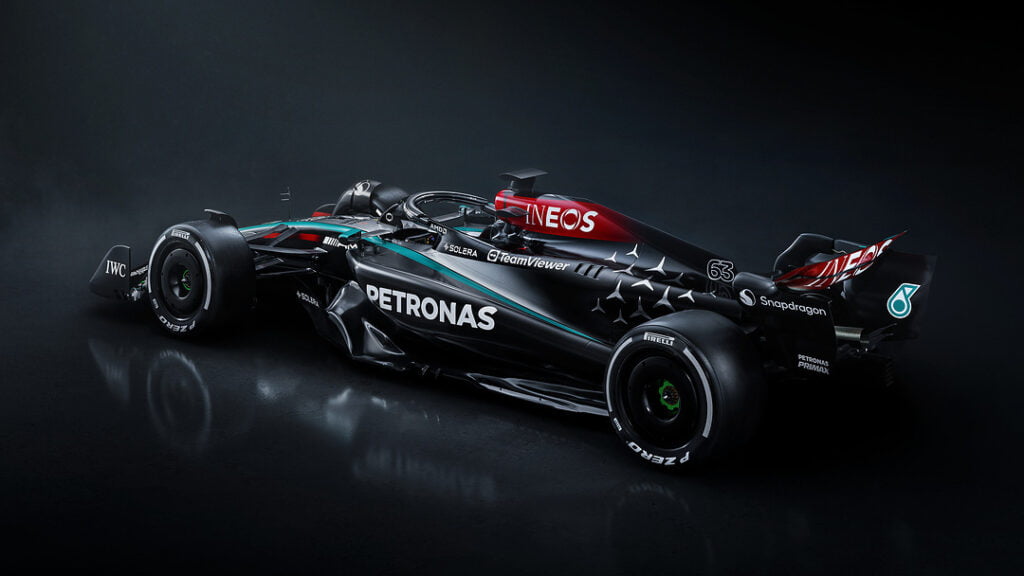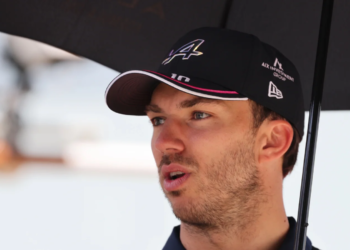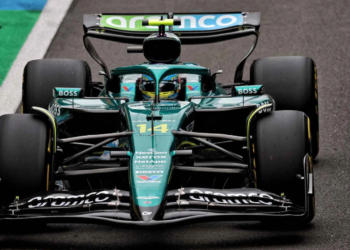Mercedes Team Principal and CEO Toto Wolff admits that “we hate losing, and that drives us” as the Brackley-based squad looks to challenge Red Bull with its W15 machine.
Since the arrival of the ground effect era in 2022, the once-dominant Mercedes team that won eight Constructors’ titles between 2014 and 2021 has picked up just one win in the previous two campaigns.
The Silver Arrows’ lack of success in recent years is in part down to chasing incorrect development paths with its initial ‘zeropod’ concept placing it on the back foot.
“We have a mountain to climb to get to the front of the field, but we are focused on doing so,” Wolff said as he set about outlining the team’s expectations for 2024.
Mercedes finished second in last year’s Constructors’ standings, narrowly beating Ferrari by a margin of three points with 409 points to 406.
However, title-winners Red Bull had a points haul of 860, more than double Mercedes’ tally and the Milton Keynes-based squad won all but one grand prix in 2023.
Meanwhile, Mercedes had its first winless season since 2011 and Wolff’s ambition is to turn the tide and start challenging the current F1 pacesetters.
Wolff admits that he can’t guarantee that the German marque will catch Red Bull this season despite pursuing a revamped philosophy with its W15 challenger.
“On one hand, you need to be realistic about the odds of beating a team that is a fair chunk ahead under these regulations, and who got things right over the last two seasons whilst we have not,” he added.
“There are no miracles in the sport. On the other hand, our ambition is strong.
“It is Red Bull and a very successful car that are the benchmark we are aiming to beat.
“I do not know when that will happen, we do not have any crystal ball. But we will know soon enough how far ahead they are and the task in front of us.”

After being used to success, Wolff admits that the downturn in form over the past two years was “necessary for us to readjust, recalibrate, and reinvent ourselves in certain areas.
“No sports team has won every single championship they participated in,” Wolff continued.
“That is just a fact. I think we pushed the needle very far, but we also knew that there would be a time when things would become more challenging. And this is what happened in 2022 and 2023.
“But it also means that you are obliged to change without throwing away all the goodness already in the team. You want to keep the good parts and work on the things that you need to develop.
“That root-and-branch approach is never easy. But we’ve made progress and look forward to taking the next step with the W15.
“It won’t be a linear path, but when we stumble, we will get back up and keep on climbing.”

That next step involves righting the wrongs of previous development with the difficult W13 and 14 machines.
The W14 received a concept overhaul at last year’s Monaco Grand Prix but was built on the foundations of the previous year’s design.
Now, the W15 is what Wolff hopes takes the team in a positive direction.
“We clearly embarked on some less successful development avenues in the last two years,” he acknowledged.
“But in Formula One, it is never a silver bullet innovation that changes your odds dramatically, it is about getting all the small things right. This is what we have tried to incorporate into W15 over the winter.
Still, being out of the winning limelight must be difficult with a team that got as accustomed to winning as Mercedes did and Wolff has been open in his painful rhetoric in many an F1 paddock over the last two seasons.
However, despite the anguish of missing out on repeated silverware, Wolff is both thinking long-term and relishing the challenge that lies ahead of his team.
“It is important to remind ourselves that what we want to achieve is to look back in 10 or 20 years and say that this was a period of success even though we had our setbacks,” he said.
“For me it is about: when you fall, you get back up. And that is what I have learned most in the last three years: it’s about the ability to recognize the learning when we fail to meet our objectives and this is the key to long-term success.
“We hate losing, and that drives us. But that does not mean that we can’t enjoy the challenge we have in front of us, working through our problems and what we need to do as a team.
“That is all part of the development.”









